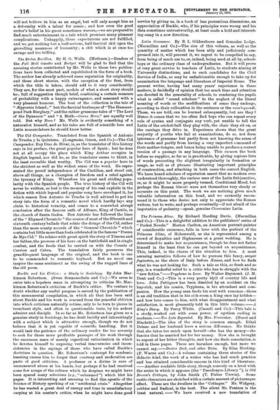Latin Grammar. By B. L. Gildersleeve and Gonzalez Lodge. (Macmillan
and Co.)—The size of this volume, as well as the quantity of matter which has been ably and judiciously com- pressed into it, will prevent it, we regret to be compelled to say, from being of much use to, or, indeed, being used at all by, school- boys or the ordinary class of undergraduates. But it will prove of very great service to teachers of Latin, to students aiming at University distinctions, and to such candidates for the Civil Service of India, as may be unfashionable enough to take up for examination the language and literature of Imperial Rome. The present writer, having had many years' experience in these matters, is decidedly of opinion that too much time and attention are devoted in the generality of schools, to rendering the pupils what is called "sound scholars" to the neglect of the literal meaning of words or the modifications of sense they undergo, according to their collocation in the sentence or the usus loquendi. These, we are told, can be learned subsequently, but are they ? Hence it comes that we too often find boys who can repeat every rule of syntax and conjugate any verb, yet unable to tell the Latin of the cricket-ball they play with, the chair they sit on, or the carriage they drive in. Experience shows that the great majority of youths who fail at examinations, do so, not from ignorance of grammar but partly from not knowing the sense of the words and partly from having a very imperfect command of their mother-tongue, and hence being unable to produce a correct version of a passage in any language. This vacuum the book before us supplies, so far as is practicable, by giving copious lists of words presenting the slightest irregularity in formation or usage, as well as of phrases illustrating important principles of construction, and attaching in both cases the correct English. We have heard scholars of reputation assert that no modern ever understood thoroughly, the various uses of the Latin Subjunctive, or, as it might be more properly termed, Conditional Mood, but perhaps the Roman literati were not themselves very steady or accurate on this point. The work we are noticing gives much valuable information on this head, and we earnestly recom- mend it to those who desire not only to appreciate the Roman writers, but to write, and perhaps eventually—if not afraid of the imputation of pedantry—speak, genuine Ciceronian Latin.


















































 Previous page
Previous page